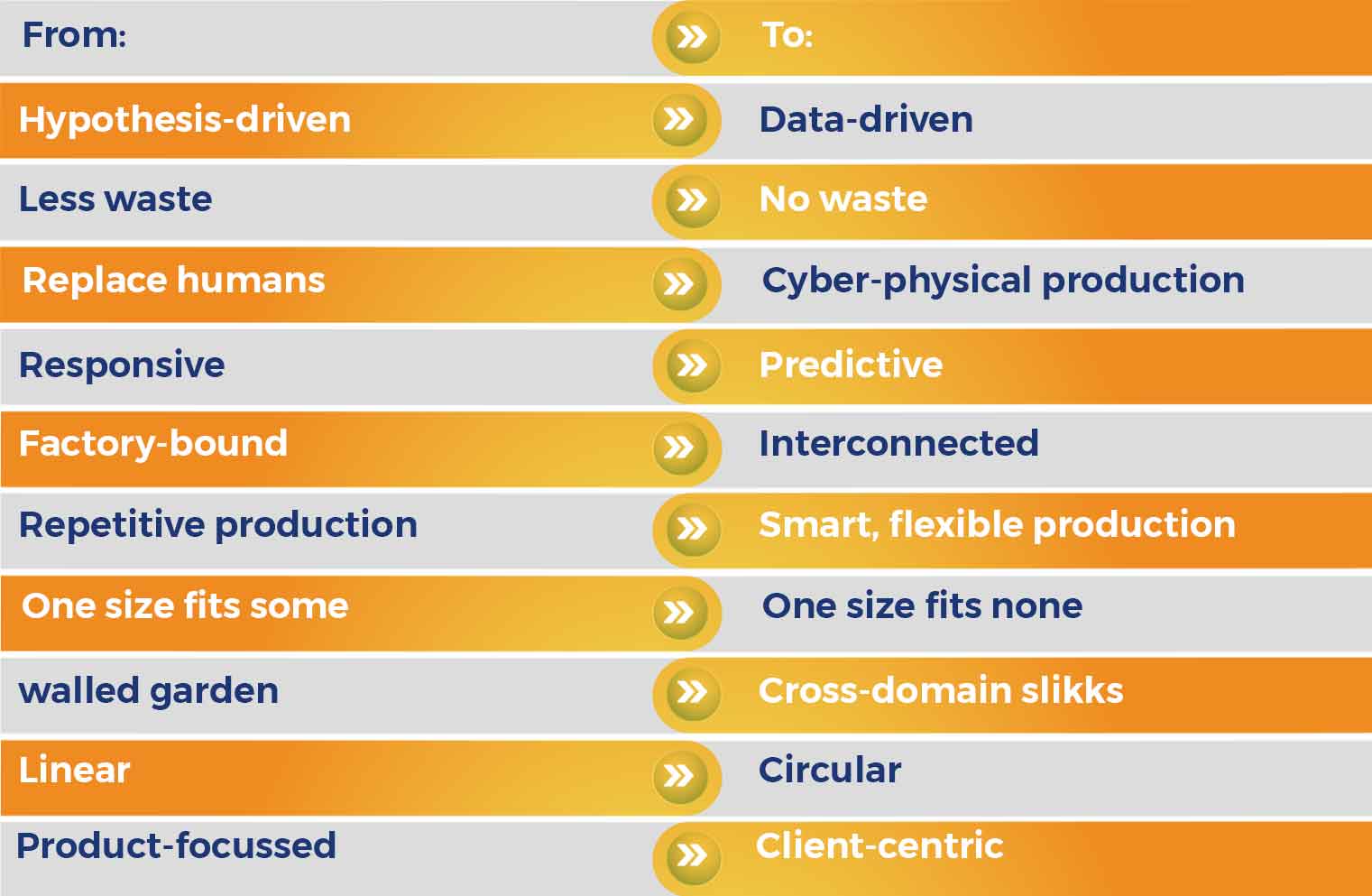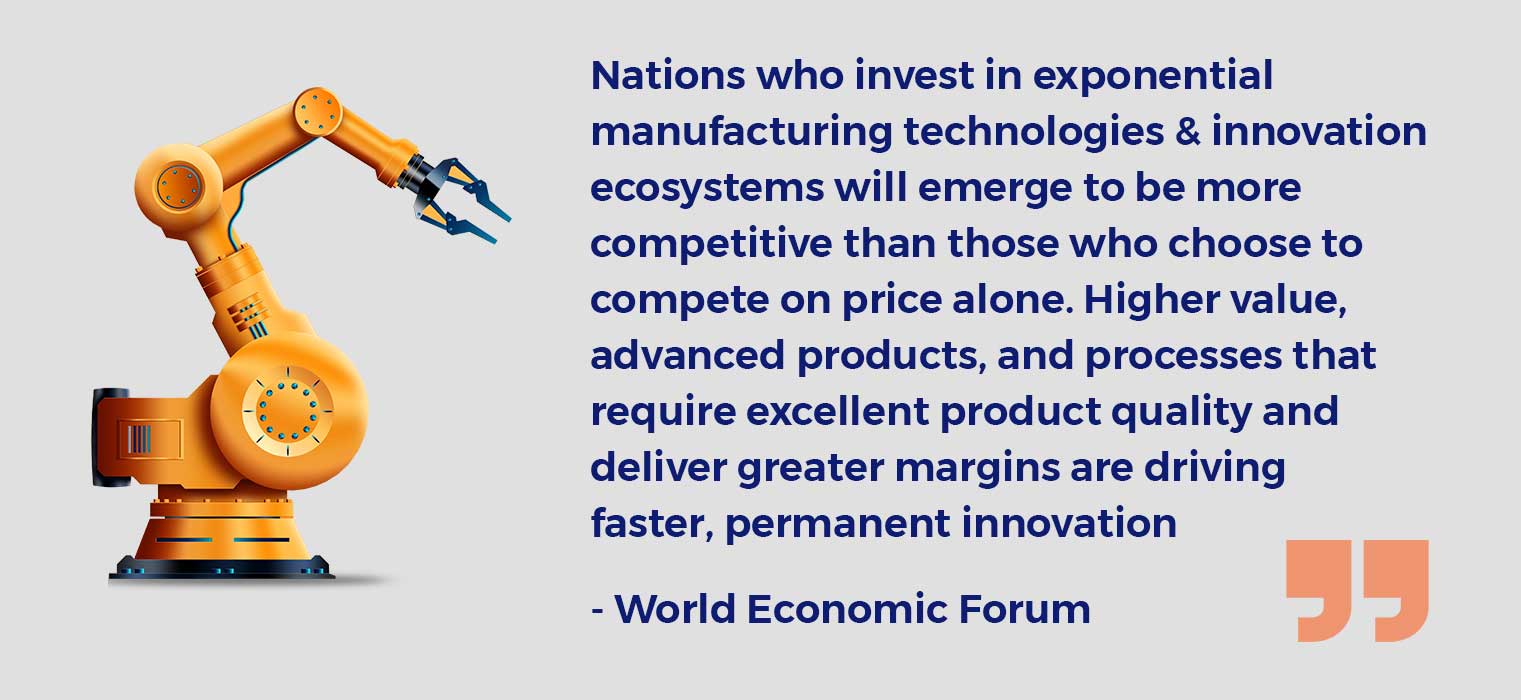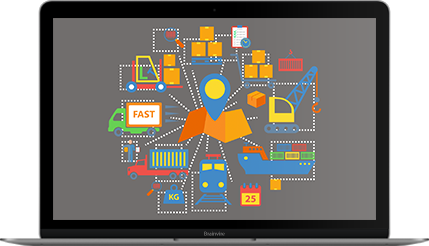Every industry has its fair share of challenges and opportunities. But in the end, it’s all about survival of the fittest. Organizations that are quick to seek out alternatives to deal with challenges, while making the best of the opportunities will be the winner of the end game.
Today more than ever, it is essential that organizations keep an open mind and learn to make the best of the technological advancements around. In order to stay relevant in this fast-evolving market and environment, organizations need to be both agile and flexible.
Digital Shift in Manufacturing Industry
Currently, there’s a new term generating quite a buzz in the manufacturing industry. The term “lights-out manufacturing” represents factories that can carry out the entire manufacturing process without any human interference. Since these machines require a minimal workforce to operate, the manufacturers can operate them at reduced costs by eliminating the need for lighting in them.
The recent wake of the pandemic has definitely worked as a catalyst in digitizing organizations of all shapes and sizes. The entire incident proves one thing, no organization is truly future-proof. On the other hand, it also signifies that businesses should always be quick and agile to acknowledge and understand possible future disruptions.

There’s no argument in affirming that the way we manufacture will never be the same forever, there’ll always be a curiosity to adapt.
Sounds interesting right? The possible modifications in the future of manufacturing can be really innovative. Let’s have a look!
Modifications to the Future Manufacturing Processes
Businesses must be quick to curate and adapt to digital strategies, based on deep knowledge of the industry, experiences gained over the years, human ingenuity, and a better understanding of the requirements of customers.
The way we manufacture products has been changing since the early 20th century in the strive to enhance the efficiency and productivity of manufacturing processes. In the next couple of decades, automation will integrate seamlessly with manufacturing processes, resulting in the reduction of cost and improved efficiency of such processes.
As the competition in manufacturing is increasing at a stable pace, as always manufacturers will keep on looking for new innovations, technologies, and procedures to keep up with the competition. Experts and veterans in the industry say that this new wave of automation and digitization will be known as “Industry 4.0”, a short for the fourth industrial revolution.
The adoption of Industry 4.0 will most likely result in increasing productivity by up to 45%.
Digitization Paving its Way
It is very likely that in the near future businesses will need to establish a better and genuine relationship with their customers. Very soon, a major portion of our manufacturing will be done through advanced computation and robots. It will require the manufacturers to change their processes and integrate digitization into their factories.

- Research and Development of the Product
Planning is an integral part of production in any industry. Manufacturers across the world are compiling teams of engineers, designers, and chemists to test different sorts of hypotheses. There is often a misconception that R&D is not essential to the manufacturing process but in reality, manufacturers spent a lot of money on it.
R&D is the only key to facilitate effective innovation and deliver the latest technologies to simplify the manufacturing process and make it more profitable. In the near future, more and more investment will be poured into the R&D process.
- Sourcing and Planning of Resources
Plans of how to produce a product at a huge scale often come after finalizing the design of a product. Then comes the difficult part of gathering makers of basic materials, part suppliers, and perfect machinery to manufacture the product on a large scale.
One of the most imminent changes to help manufacturers handle large-scale production would be decentralized manufacturing. This type of manufacturing employs facilities spread across different geographical locations that work in sync with each other to fulfill the huge demands of the consumers at a faster pace.
- Reduction in Industrial Downtime
The industrial downtime that manufacturers experience can turn out to be very costly. As we move forward with Industry 4.0 manufacturers are more likely to employ pieces of machinery that are equipped with capabilities such as predictive intelligence and predictive maintenance.
This will allow the manufacturers to generate insights about the condition of machinery and take appropriate actions at the appropriate time to minimize downtime. The next generation of technological efficiency will be driven by predictive analytics and most probably each and every piece of machinery will have a sensor monitoring its health.
- Better Management and Augmentation of Labor
With the advancements in automation and robotics the role of humans in a manufacturing process will diminish in the course of time. These technologies are all set to monitor the manufacturing process by following instructions and eliminating human errors.
Such systems use sound cues and overhead scanners to keep track of the assembly and stop the workers immediately if any of the steps are done incorrectly. Off-site engineers can also employ scanners to analyze the progress of manufacturing in real-time and take care of issues faced by the workers.
- Production, Assembly, and Machining
Sooner or later, automation will take over the jobs previously handled by humans. Manufacturers over different industries are quickly adopting new and advanced technologies such as 3D printing and robotics. These technologies are getting more and more accurate by the day.
With the urgency to keep up with the changing demands of the customer, manufacturers are driven to quickly adapt and integrate these technologies into their manufacturing processes. The future factories will be intelligent production houses that run on networked machines that communicate seamlessly and enhance the efficiency of manufacturing processes.
- Ensured Quality of products
As more and more manufacturers move towards digitization it is very likely that quality checks to assure the quality of products will be integrated into the codebase of the factories. Various innovative technologies such as blockchain and computer vision are already being widely used among manufacturers to ensure the quality of products.
Factories in the future will employ these technologies to pick up imperfections that may be missed by the human eye. Manufacturers will train artificial intelligence bots to spot manufacturing issues with ease. Organizations of the future could simply use a single system to manage recalls in a way that easily identifies the origin of the faulty parts or batch.
- Warehouse Automation
The demand for warehouse space has exploded in the last few years mainly because of the rise in eCommerce. Many businesses are quickly adopting automation and robotics to establish better and fast warehouse management. Manufacturers are mainly focusing on palletizing and picking to implement these technologies.
Gone are the days of sorting and scanning inventories with clipboards. Businesses today rely on computer vision technology to sort, spot defects, and scan inventories. The machine vision technology is capable of measuring the dimensions of products, inspecting the quality of products, and counting the number of products with ease.
- Management of Distribution and Supply-chain
Facilitating an effective distribution process is not an easy task. To make this process easier future manufacturers will employ advanced blockchain and IoT technologies. The decentralization and automation of supply chains will make IoT and software for shipments more and more essential.
The fragmented nature of supply chains is perfectly suitable for decentralized technologies that could be of a bigger picture of making global commerce more efficient. Recent developments in these technologies are driving blockchain networks to be used by ports, shippers, custom offices, and banks to track freight in the global supply chains.
Connect with Manufacturers Expectations
The previous has been a total roller coaster ride for the manufacturing industry mainly because of the pandemic raging wrath across the planet. Prior to the pandemic, the manufacturing sector was enjoying good momentum but as we all now know the devastating impact of the containment measures and lockdowns on the industry.
This taught the industry an important lesson which is to incorporate digitization into their manufacturing and distribution processes.
The manufacturing industry will continue to change with time. However, there are a few trends that perfectly depict the current state of the manufacturing industry.

1. Increased investment in technology: The recent pandemic has compelled businesses to enhance their digital capabilities. This has led to an increase in investment in the implementation of research and development of technologies. These investments are not going in vain as many organizations are coming up with various new and innovative solutions to enhance efficiency and reduce the cost involved in the manufacturing process.
2. Flexible supply chain: Globalization has heavily complicated the supply chain of the manufacturing industry. A product such as a mobile phone has to go through many different countries before ending up in the hands of the customer. However, now efforts have been made by many organizations to simplify this conundrum by automating the process with a digital supply network (DSN) and gain real-time data and information of the activities across the complicated supply chain.
3. Customization of the workplace: After the disruption caused by the pandemic many manufacturers are looking for newer ways to manage the employees and workplace. These alterations are being carried out to minimize the adverse effect of disruptions and uncertainties. As per recent surveys, many manufacturers seem to be on the way to plan and develop hybrid models for all of their business operations in the due course of time.
4. Minimizing the impact caused by disruptions: Many manufacturers seem to have realized the need to develop better strategies to tackle the disruption caused in the industry. Digital technologies are the perfect tool to tackle these issues. Technologies can help an organization enhance transparency and predict future disruptions through business intelligence.
Manufacturing Industry in the Future
The manufacturing industry has been evolving at a steady pace, ever since its inception. Manufacturers are in a constant urge to minimize their costs and make their operations more efficient. The industry has come a long way as over the years various new innovations have been implemented to enhance the efficiency of the processes.
Various predictions by different analysts state that the manufacturing industry will go through a massive change by the end of the decade. The most notable change might be seamless collaboration and connectivity among every stage involved in the manufacturing process. These changes will be driven by the combination of customer needs, innovation, the economics of the product, and mainly technology.

Though we cannot predict the future with great accuracy, it is most likely that these changes will be driven by the fight to capture or create value. Here are a few vital factors that are most likely to bring the change in the manufacturing industry.
Consumer Demand: Consumers today are becoming more aware and curious about the products they use, resulting in an exponential rise in their power. Even though the power of the consumers is on a rise, their needs are still not met by the manufacturers. This is why manufacturers now need to keep a close eye on the demand of their consumers which these days are often based on customization, personalization, and co-creation.
Production and its economics: The manufacturing industry has always been an industry that is hard to navigate by new players. However, recent advancements in technology and the shift in policies have contributed greatly to overcome those obstacles. Moreover, the latest technologies such as robotics, additive manufacturing, and materials science combined with the changing demand of consumers have widened up the spectrum of the manufacturing industry.
The essence of a product: Similar to the changing nature of consumer demands, the essence or nature of the products are also changing. Simple products are now becoming more responsive and intelligent. Simultaneously, the use of the products by consumers is also changing. In a world where the software of a product holds the same importance as the hardware of the product, manufacturers must be quick to adopt the platform-plus-app model to enhance their range of customization and personalization for customers.
Value chain and its economics: With the rise in the usage of online shopping platforms the line between manufacturers and retailers are fading at a very fast pace. Traditional manufacturers are not connected with their end customers very well resulting in a widening gap of communication between customers and manufacturers.
Furthermore, as the mindset of the customers is also changing they too experience this gap and are quickly opting for manufacturers that connect directly to them. Manufacturers of the future will have to work hard to narrow the gap between them and their customers.
What's Next Now?
The advancements in technologies are making manufacturing processes more customizable, efficient, automated, and modular every passing day. The sad part here is that manufacturers are slow in terms of the adoption and implementation of new technologies. Irrespective of this fact, there’s no denying that the future of manufacturing will be driven by the amazing capabilities of digitized technologies. It is very likely that factories will enhance their productivity massively while minimizing both defects and costs by properly utilizing the data and robotics.
The technologies that will contribute the most to the next evolutionary step of the manufacturing industry are artificial intelligence, smart robotics, the Internet of Things (IoT), and automation. The way manufacturing processes are carried out in the future will be very unrecognizable to our generation. With technologies such as blockchain and advanced robotics, the manufacturing sector will soon witness unprecedented growth and efficiency.
Lastly, it is most likely that the future of manufacturing will be deeply impacted by the changing nature of consumer demands. Manufacturers will have to be agile to keep up with these demands.
Related Articles
Digital Transformation
A Deep Dive into Shopify Winter Edition 2025: Anything but a ‘Boring Edition’
Digital Transformation
Adobe Experience Manager (AEM): The Ultimate Guide for Enterprises
Digital Transformation
Angular vs React: A Detailed Comparison for Developers


